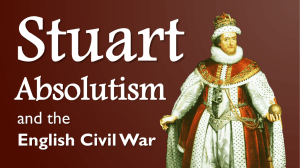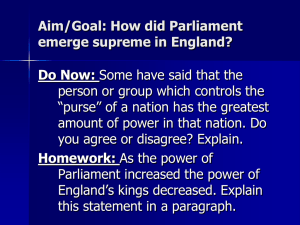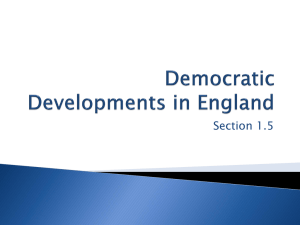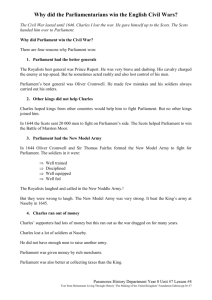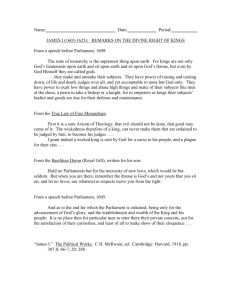R: Quiz 22 Answers - Tapestry of Grace
advertisement
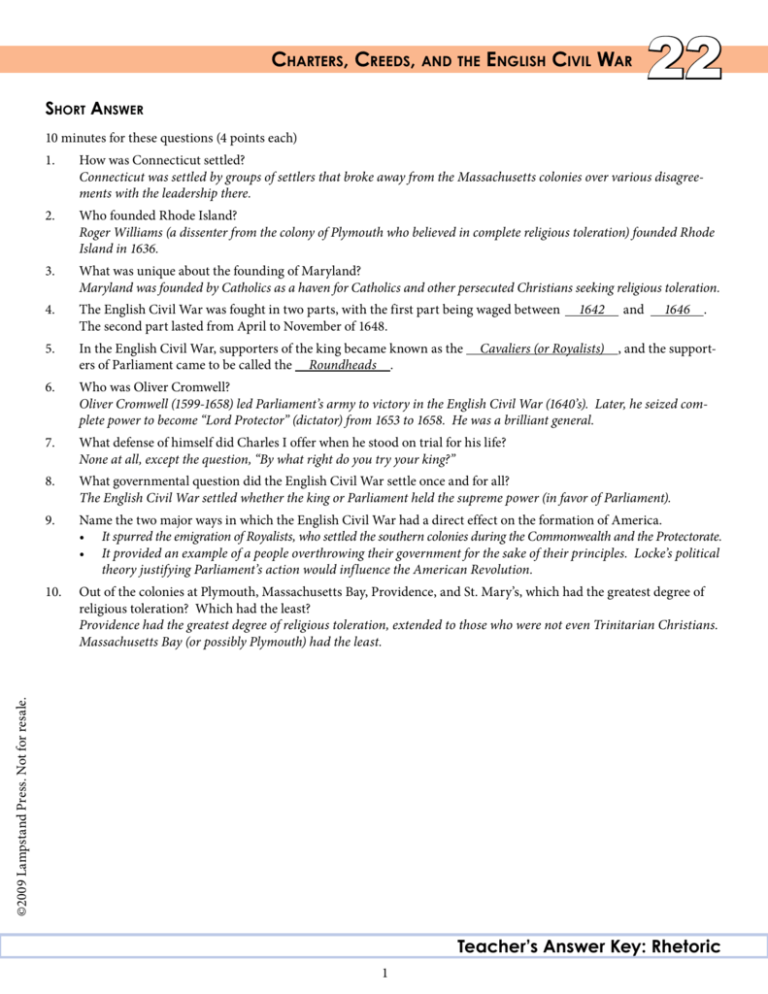
Charters, Creeds, and the English Civil War Week Title Short Answer 22 10 minutes for these questions (4 points each) How was Connecticut settled? Connecticut was settled by groups of settlers that broke away from the Massachusetts colonies over various disagreements with the leadership there. 2. Who founded Rhode Island? Roger Williams (a dissenter from the colony of Plymouth who believed in complete religious toleration) founded Rhode Island in 1636. 3. What was unique about the founding of Maryland? Maryland was founded by Catholics as a haven for Catholics and other persecuted Christians seeking religious toleration. 4. The English Civil War was fought in two parts, with the first part being waged between 1642 and 1646 . The second part lasted from April to November of 1648. 5. In the English Civil War, supporters of the king became known as the Cavaliers (or Royalists) , and the supporters of Parliament came to be called the Roundheads . 6. Who was Oliver Cromwell? Oliver Cromwell (1599-1658) led Parliament’s army to victory in the English Civil War (1640’s). Later, he seized complete power to become “Lord Protector” (dictator) from 1653 to 1658. He was a brilliant general. 7. What defense of himself did Charles I offer when he stood on trial for his life? None at all, except the question, “By what right do you try your king?” 8. What governmental question did the English Civil War settle once and for all? The English Civil War settled whether the king or Parliament held the supreme power (in favor of Parliament). 9. Name the two major ways in which the English Civil War had a direct effect on the formation of America. • It spurred the emigration of Royalists, who settled the southern colonies during the Commonwealth and the Protectorate. • It provided an example of a people overthrowing their government for the sake of their principles. Locke’s political theory justifying Parliament’s action would influence the American Revolution. 0. Out of the colonies at Plymouth, Massachusetts Bay, Providence, and St. Mary’s, which had the greatest degree of religious toleration? Which had the least? Providence had the greatest degree of religious toleration, extended to those who were not even Trinitarian Christians. Massachusetts Bay (or possibly Plymouth) had the least. ©2009 Lampstand Press. Not for resale. . Teacher’s Answer Key: Rhetoric Charters, Creeds, and the English Civil War Week Title Essay Question 22 20 minutes for one of these questions. If extra time is needed, allot 30 minutes. (60 points) . The English Civil War was a landmark event in the history of Western civilization. In an essay, summarize the causes and effects of the English Civil War. (Hint: the causes arose chiefly from conditions in England; the effects can be divided between immediate results and long-term ones.) Points an Excellent Answer Might Include Causes • James I believed and upheld divine right of kings • Charles I (his son) alienated Parliament even further. • Spent money more lavishly than he could afford, and then tried to raise the difference himself without asking Parliament • Persecuted Puritans, thwarting their attempts to reform the Church of England • Fought unsuccessfully against the Scots and Irish • Tried to rule without Parliament, dissolving the Short Parliament after only three weeks • Long Parliament passed reforms limiting the king’s power. • Parliament would not trust the king to command another army, publishing instead the Grand Remonstrance expressing complaint • Charles entered Parliament in person, demanding the surrender of five of his opponents. • Parliament raised an opposing army, inaugurating the Civil War. Short-term Effects • Shocked all of Europe: no one had heard of people beheading their king! • Proved that England was not ripe for a strictly republican government • Failed: Charles II restored, purposely reversing most of the Puritans’ moral reforms ©2009 Lampstand Press. Not for resale. Long-term Effects • Underscored the truth that the king was not above the law • Greatly increased the prestige and power of Parliament, to the point that in 1688 Parliament could depose one king (James II, a Catholic) for another (William, a Protestant Dutchman married to Charles II’s daughter) • Began the trend of increased Parliamentary power and decreased monarchy • Provided a precedent for the American colonists in their later attempt to throw off their lawful government (that of England) and create their own new republic Sample Answer The English Civil War was a landmark event in the history of Western civilization. A series of increasing provocations by England’s kings led Parliament to field its own army against its king, eventually trying and beheading him. Although the short-term effects seemed to be all undone by the Restoration, the long-term effects of this event were very great indeed. The causes of the English Civil War arose chiefly from conditions in England. It all began when James I, and his son Charles I, tried to rule like the absolutist kings of Europe. These kings upheld the divine right of kings as an excuse for them to ignore Parliament. Charles spent more lavishly than he could afford, and then he tried to impose his own taxes without asking Parliament. He persecuted the Puritans, who were gaining strength in Parliament. Whenever he could, he dissolved Parliament, ignoring their demands. Eventually, Parliament raised its own army and faced the king’s forces in battle, opening the English Civil War. The short-term effects of the Civil War were not what Parliament had hoped. Parliament had hopes of establishing a republican Commonwealth. However, their army was too strong for them to control. Within only a few years, the army made Oliver Cromwell a dictator, the Lord Protector. His son after him was a bad ruler, and the English invited Charles’s son back as Charles II. This Restoration seemed to undo everything that the Puritans had tried to Teacher’s Answer Key: Rhetoric Charters, Creeds, and the English Civil War Week Title 22 accomplish during the Civil War. The Civil War seemed to have failed. In the long-term, however, the English Civil War did have an effect. Parliament’s actions made the point strongly that the king was not above the law. Ever since that time, Parliament’s power has steadily increased while that of monarchs has diminished. In America, leaders following the precedent of Parliament would later throw off British rule and make themselves into a republic. The Civil War was the beginning of this trend towards democratic rule. Although the English Civil War seemed at first to have failed in its goals, it had an immense effect on the course of history. The English Parliament stood up to its king’s abuses of his power and established the truth that kings are under the law. In this, it was a turning point in history. 2. Compare and contrast Charles I and Oliver Cromwell. Address their Christian character (as evidenced by their deeds), their beliefs about government, and their actions as leaders. Points an Excellent Answer Might Include ©2009 Lampstand Press. Not for resale. Charles I • Sought to increase his own splendor and power like the absolutist kings of Europe • Over-spent on the arts and other marks of grandeur • Willing to go back on promises made to Parliament and the people • Concerned with the power and rights of the king rather than the concerns of the people, for which he had little sympathy or understanding • Head of the Church of England, defended high-church rituals and institutions, with Catholic leanings • Championed the divine right of kings: the king that God had appointed was not accountable to any other men, but to God alone • Considered himself above the law (“By what right do you try your king?”) • Refused to engage in dialogue and compromise (foundational to Parliamentary government); insisted on being obeyed implicitly • Considered reuniting the Church of England with the Roman Catholic Church • Nursed personal animosity towards Parliamentary leaders, crippling attempts at discussion • Went behind Parliament’s back to raise money, etc., trespassing on the traditional privileges and authority of Parliament Oliver Cromwell • Humble background as an English country squire • Natural genius for military leadership • Strong leader by nature; expected and inspired obedience • Dependent on God’s will through prayer • Attributed his successes to God’s help • Imposed discipline on his troops, including regular prayer and fines for profanity; they were known to march into battle singing psalms • Shared Puritan understanding of government as a covenant between rulers and people • Rulers not fulfilling their covenantal obligations were also under the law and therefore susceptible to being removed • Headed the New Model Army during its seizure of power by force • Seized power in a military coup, when Parliament’s slow reforms did not satisfy him • Agreed with the Puritan vision to reform the church away from ritual and ceremony towards the preaching of God’s Word • Attempted, as a ruler, to enforce godliness by might • Made strict laws governing the morality of his subjects according to Puritan standards • Tolerated other Christian denominations, including Quakers and Catholics • Willing to resort to brutal, bloody tactics against enemies (Irish massacres) • Refused the title of king when it was offered to him by Parliament, though he had reestablished the monarchy in all but name Teacher’s Answer Key: Rhetoric Charters, Creeds, and the English Civil War Week Title 22 ©2009 Lampstand Press. Not for resale. Sample Answer Charles I and Oliver Cromwell were opposed to each other in countless ways. They were of very different character, with opposing beliefs about the nature of government. Oddly, however, some of their actions as leaders ended up being similar, though for different reasons. The character of these two men differed widely, reflecting their different backgrounds. As king, Charles was preoccupied with the king’s prestige. He felt that kings were to be obeyed implicitly and refused to dialogue with Parliament about any compromises. As head of the Church of England, he persecuted Puritans sharply. Among these Puritans was Cromwell: a low-born English squire, stern, simple, and blunt, with an incredible ability to inspire men to follow him. In the Civil War, Cromwell depended on prayer and attributed his successes to God. He also imposed discipline on his forces, including regular prayer and fines for profanity. Cromwell was said to have told portrait painters to paint him exactly as he was, “warts and all.” In their upbringing, values, and perspective, these men were very different. Charles and Cromwell also had very different beliefs about the nature of government. Charles was a staunch supporter of the “divine right of kings”: since God appointed all authorities, kings were accountable to God alone for their rule. His one defense at his trial for treason was the rhetorical question, “By what right do you try your king?” The Puritan view, which Cromwell espoused, was very different. Puritans believed in a covenant theory of government. Rulers and ruled were in a covenant by which the ruler promised to serve his people and the ruled promised to submit to him. If a ruler broke his part of the covenant, he could and should be removed. These different views of the nature of government informed these two men’s very different perspectives on the English Civil War. These differences in character and beliefs led the men to different courses of action, and yet those courses of action ended up looking remarkably similar. Charles freely trespassed on the traditional privileges and authority of Parliament, raising taxes on his own and disbanding Parliament at will. For these things, the English people fought and beheaded him. Cromwell was, at first, a supporter of Parliament, as one of its members. However, as order degenerated, he allowed his army to seize power in a military coup and appoint him Lord Protector, or dictator for life. As ruler, he attempted to enforce godliness by might with strict rules imposing Puritan morality on his subjects. Cromwell sought to rule in the interests of his people, something that Charles did not even consider, but he still ruled as an unchecked despot, as Charles had done. Charles and Cromwell were direct opposites in many ways. The one was an absolutist king, with much arrogant self-interest, while the other was a God-fearing Puritan revolutionary. The one believed in the divine right of kings, while the other believed in covenantal government. Yet both of them, in the end, engaged in the same despotic practices, revealing the similarity of sinful motives that can exist in any man’s heart. Teacher’s Answer Key: Rhetoric


